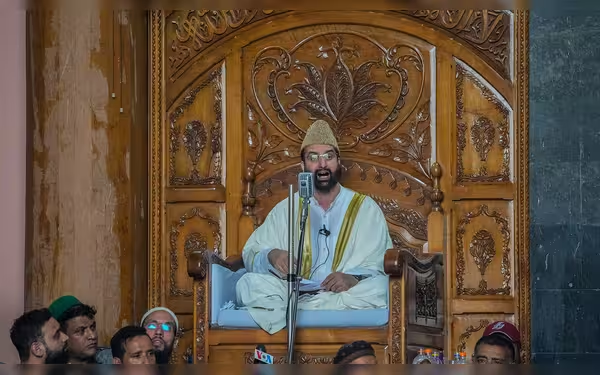Friday, October 4, 2024 02:29 AM
Kashmiri Leader Criticizes Elections Amidst Dissent in Region
- Mirwaiz Umar Farooq condemns elections as ineffective.
- Kashmir faces ongoing civil liberties clampdown since 2019.
- Local elections viewed as a façade by many Kashmiris.
 Image Credits: arabnewspk
Image Credits: arabnewspkKashmiri leader Mirwaiz Umar Farooq criticizes local elections, highlighting ongoing dissent and civil liberties issues in the region.
In the picturesque yet politically charged region of Kashmir, a significant local election is underway, but the atmosphere is anything but festive. The elections, which are being held to establish a local government, come against the backdrop of a long-standing conflict between India and Pakistan over the territory. This conflict has deep roots, dating back to the partition of India in 1947, and has led to numerous wars and ongoing tensions. The recent political developments, particularly the revocation of Kashmir's semi-autonomous status by the Indian government in 2019, have only intensified the situation.
Mirwaiz Umar Farooq, a prominent Kashmiri leader and cleric, has voiced strong concerns regarding the elections. He argues that these polls will not address the core issues that have plagued the region for decades. In a recent phone interview, he stated, "These elections cannot be the means to address the larger Kashmir issue." His words reflect a sentiment shared by many in the region who feel that their voices have been stifled since the Indian government’s controversial decision to strip Kashmir of its autonomy.
The elections, which are being promoted by the Indian government as a "festival of democracy," are seen by many locals as a mere façade. They believe that the elections will not lead to genuine representation or empowerment. Instead, they view this as an opportunity to express their dissent against the changes imposed in 2019, which they fear could alter the demographic makeup of the region. Mirwaiz emphasized that while there may not be visible unrest like before, there exists a "strong, latent public resistance" to the current political climate.
Since the 2019 changes, the region has experienced a significant clampdown on civil liberties. Authorities have detained numerous political activists, including Mirwaiz himself, who has spent much of the last five years under house arrest. This has led to a chilling effect on political discourse, with many feeling "dispossessed and disempowered." Mirwaiz pointed out that the crackdown has severely limited the ability of his group, the All Parties Hurriyat Conference, to engage with the public and advocate for their rights.
Historically, Kashmir has been a flashpoint for conflict between India and Pakistan, with both nations claiming the territory. The United Nations had proposed a referendum in 1948 to allow the people of Kashmir to choose their allegiance, but this has never materialized. Over the years, discontent has simmered, leading to armed uprisings and a persistent demand for self-determination among many Kashmiris.
As the elections unfold, the absence of calls for boycott from pro-freedom groups is notable. Many leaders are currently imprisoned, and the political landscape has shifted dramatically. Some activists, who previously rejected participation in elections under military rule, are now running as independent candidates. Mirwaiz has expressed skepticism about the legitimacy of these elections, suggesting that they have been engineered to favor the ruling party's agenda.
The situation in Kashmir remains complex and fraught with tension. While elections are a crucial aspect of democracy, the context in which they are held is equally important. The voices of the Kashmiri people, particularly those advocating for self-determination, must be heard and respected. As the world watches, it is essential to recognize that true democracy cannot flourish in an environment where dissent is silenced. The path to peace in Kashmir lies not in superficial elections but in meaningful dialogue that includes all stakeholders, particularly the voices of the Kashmiri people themselves.













